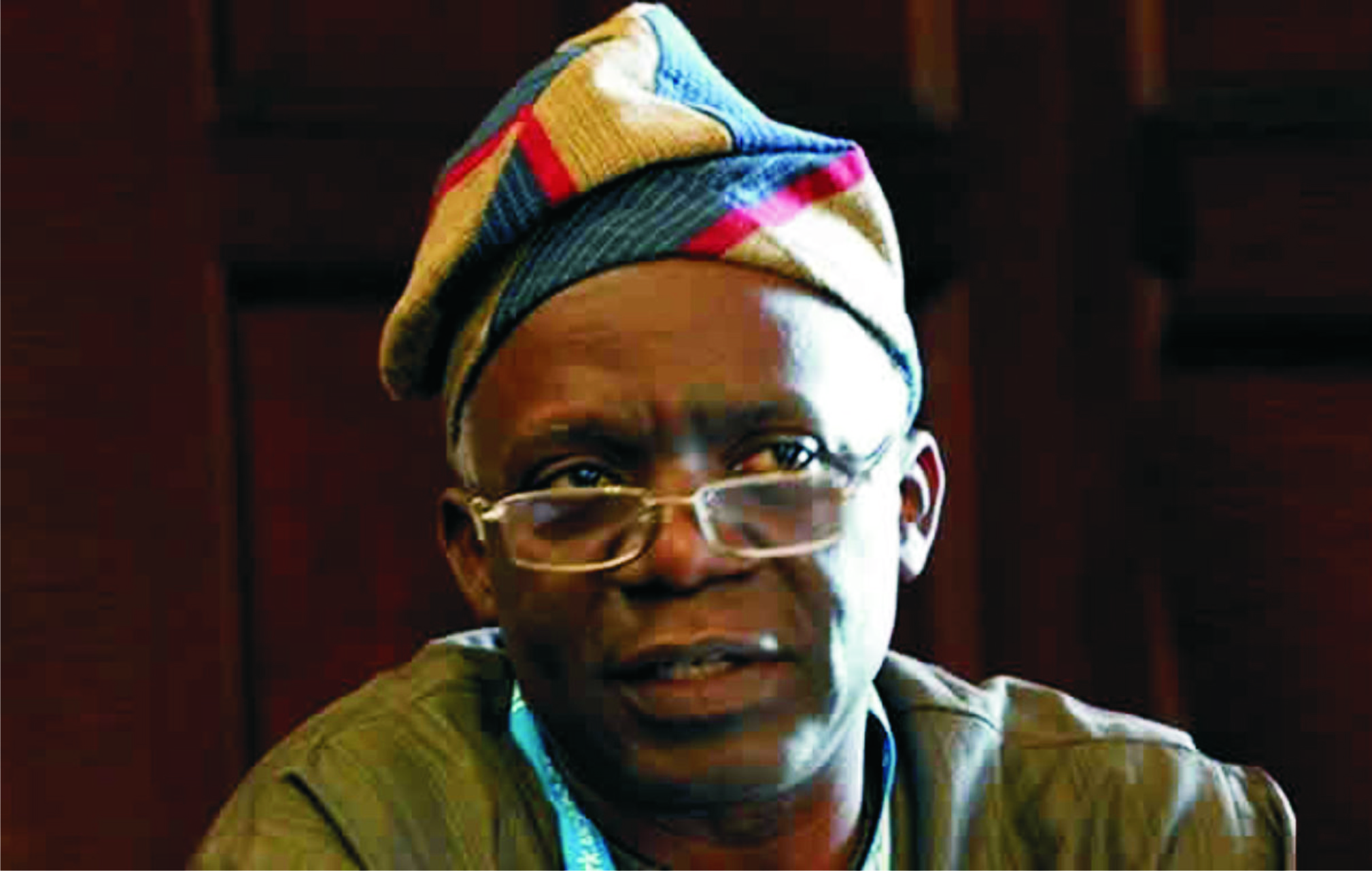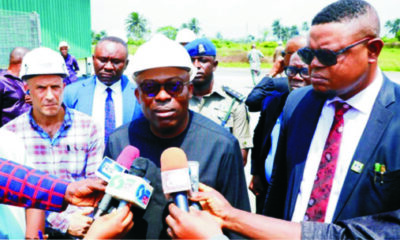News
FAAC: Don’t Blackmail Nigerians To Accept Deregulation, Falana Tells NNPC

The legal luminary and Senior Advocate of Nigeria, SAN, Chief Femi Falana, has told the Nigerian National Petroleum Corporation (NNPC), not to blackmail the government to accept deregulation, saying that the statement that there is no money to remit into the federation account next month (May) was tantamount to blackmailing.
This is as the former chairman of the Independent National Electoral Commission (INEC), Prof Attahiru Jega said that a new Nigeria is possible if the people should come together irrespective of tribe or religion in the interest of unity.
The two spoke in Abuja, yesterday at a lecture in commemoration of the 80 years anniversary of a foremost labour activist, Prof Omotoye Olorode.
Falana, who was the guest speaker at the occasion, reiterated his call for the Federal Government to compel the NNPC to return the unremitted money between 2010 and 2014 and another N94trillion oil money allegedly held by oil operators.
According to him, “The Auditor-General of the Federation has revealed that between 2010 and 2014, $16billion worth of crude oil was not accounted for by the NNPC.
“Also, the Revenue Mobilisation and Allocation Commission, and NEITI have come out to say that the NNPC has failed to remit to the federation account, about $22billion dividends paid by the LNG.
“The NNPC has not, up to this moment, denied any of these serious allegations. So, if they say there is no money now, it is meant to blackmail Nigerians that the corporation won’t remit money because it is paying for subsidy. Federal and state governments would then move to stop subsidy so they can have money to pay salaries, allowances and pension etc.
“But Nigerians must tell the government that there are alternative sources. We have written to the President about how government can recover N94billion. We are going to insist now that recovering this money is the way to go.”
The human right activist in his presentation titled, ‘Labour and the quest for Nigeria’s development: Reflections and prognosis on the way forward’, accused the Federal Government of dividing the country through lopsided appointments.
He equally accused the labour movement for abandoning the traditions of the founding fathers such as Michael Imoudu, Nduka Eze, Wahab Goodluck, Hassan Sunmonu and Ali Ciroma generations.
Falana alleged that the labour movement started to derail from the labour tradition under Pascal Bafyau era, adding that the movement has continually suffered a lack of clear-headed, unambiguous and principled stand on national development from Bafyau to Adam Oshiomhole down to Abdulwahed Omar and presently under Ayuba Wabba.
Also speaking, the Chairman of the occasion and former chairman of INEC, Prof Attahiru Jega, said that the labour movement has a crucial role to play in ensuring the emergence of a government that is built on social justice.
He said, “Labour had played that role in the decolonisation process in this country. But since the era of the Structural Adjustment Programme (SAP) labour has been declining in opposing unfriendly policies that are affecting the Nigerian people.”
“A new Nigeria is still possible and there is the need to find ways and means of energizing the labour movement and ensure it is positioned to play its roles within nation-building excellently well.”
News
FG Targets Production Of Locally Made Vehicles By Dec
The Minister of Industry, Trade and Investment, Dr Doris Uzoka-Anite, has affirmed that Nigeria now has the capacity and materials to manufacture Made-In-Nigeria cars for local use and export.
With the enabling environment being provided by the government, she said manufacturers should be held responsible if the cars are not rolling out by December 2024.
Currently, Nigeria produces less than 10 per cent of the vehicles used in the country.
Last year, Nigeria’s vehicle assembling industry, estimated to be worth around N302billion, tanked to a new low due to increasing production costs and weakened demand for locally assembled automobiles.
According to the Manufacturers CEOs Confidence Index, activities of motor vehicles and miscellaneous assembly deteriorated further below the benchmark (50 points) from 48.6 to 46.7 points.
But speaking at the Automotive Component Manufacturers meeting in Abuja, she noted that the automobile industry is faced with both challenges and opportunities.
A statement issued last Friday by the Director of Information and Public Relations, Adebayo Thomas, said, “In a significant move aimed at fostering sustainable growth and development in Nigeria’s automobile industry, the Federal Government has issued a clarion call to all stakeholders, including manufacturers, dealers, regulatory bodies, and other players in the automobile ecosystem.
“The call comes as part of a broader strategy to enhance the sector’s contribution to the nation’s economy.”
Encouraging the stakeholders to key into the Nigerian Automotive Development Policy, the Minister said, “As far as we are concerned, the auto industry is now set to go.
“We are counting on all stakeholders to make that happen. If we do not produce made-in-Nigeria cars before the end of this year (December), it will be your fault, because I am sitting down here giving you all the assurances that this administration has created the enabling environment to make sure that the auto policy kicks off.”
Anite emphasised the need for collaboration among manufacturers, dealers, regulatory bodies, and other players in the automobile ecosystem, saying by working together, they can address challenges, streamline processes, and drive innovation.
She also urged stakeholders to maintain high-quality standards across the board, including vehicle manufacturing, safety features, emissions control, and after-sales services.
Stringent adherence to quality, she said, will boost consumer confidence and attract investment.
The minister assured all that the government would continue to encourage increased investment in research and development, adding that, innovations in electric vehicles, fuel efficiency, and alternative energy sources are critical for long-term sustainability.
On local content, she also emphasised the importance of promoting local content by sourcing materials and components locally.
By doing this, she said, the sector can create jobs, reduce import dependency, and contribute to economic diversification
In his introductory comments, the ministry’s Permanent Secretary, Nura Rimi, emphasised the significance of team action and shared vision as outlined in the Nigerian Automotive Development Policy.
He also urged stakeholders that the country “will overcome obstacles and unleash the full potential of Nigeria’s automotive component sector.”
He encouraged NADDC and other stakeholders to use the chance to form alliances, explore new areas of collaboration, and devise ways to catapult the automotive components manufacturing industry to new heights of success.
The statement added, “The government’s charge underscores the pivotal role stakeholders play in shaping its trajectory. Their commitment to sustainable practices will drive Nigeria’s automotive sector towards a brighter and more prosperous future.
“Environmental Responsibility: Stakeholders are reminded of their environmental responsibilities. Sustainable practices, recycling, and eco-friendly manufacturing processes are essential for a greener future.”
News
Waive Tax On Electronic Imports, Women Engineers Appeal To Tinubu
The Association of Professional Women Engineers of Nigeria (APWEN), Lagos Chapter, has called on President Bola Tinubu to exempt the importation of electronic components from taxation for inventive engineers.
Chairman of APWEN, Ms Atinuke Owolabi, said this a in statement yesterday in Lagos, in commenration of the 2024 World Creativity and Innovation Day, with the theme: “Step Out and Innovate”.
The Tide source reports that World Creativity and Innovation Day is a global UN Day, celebrated on April 21, to raise awareness about the importance of creativity and innovation in problem solving.
This is with respect to advancing the United Nations’ sustainable development goals, also known as the global goal.
Owolabi explained that such a measure would significantly enhance technological progress, support local innovators, and elevate Nigeria as a leading hub for innovation globally.
She stated that in a world marked by dynamic challenges and unprecedented opportunities, creativity and innovation stand as the driving forces behind progress and transformation.
According to her, women engineers recognise the critical role that innovation plays in shaping our societies and driving sustainable development.
”On this occasion, we affirm our commitment to fostering a culture of creativity and innovation within our organisation and the broader engineering community.
”Together, let us step out, innovate, and inspire the next generation of women engineers to reach even greater heights of achievement and impact.
”We believe that by stepping out of our comfort zones and embracing new ideas, technologies, and approaches, we can unlock innovative solutions to the complex challenges facing our world today,” she said.
According to her, the theme: ‘step out and innovate’, serves as a call to action for women engineers everywhere to break barriers, challenge conventions.
She noted that it would also pioneer groundbreaking solutions that would propel them toward a brighter and more sustainable future.
Owolabi disclosed that in celebration of the World Creativity Day, APWEN Lagos had inaugurated an artificial intelligence club tailored for female engineering students and young engineers.
She said that the proactive initiative aimed to inspire and equip young engineers with cutting-edge technological insights.
Th chairman said, “Additionally, we already have a 200-capacity hall to set up a resource, technology, and innovation hub to empower women and girls in engineering.
”This endeavour serves as a catalyst for encouraging aspiring female engineers to embrace innovation and stay abreast of emerging trends in the field.
”APWEN Lagos stands united in its dedication to promoting diversity, inclusivity, and excellence in engineering.
“We encourage all female engineers to seize this opportunity to unleash their creativity, explore new frontiers, and make an indelible mark on the world.”
News
Pan-Igbo Group Hails Dangote Group For Reducing Diesel Price
A pan-Igbo group, Ndigbo Unity Forum (NUF), has commended the Chairman of the Dangote Group, Alhaji Aliko Dangote, and his management for reducing the price of diesel from N1,600 to N,1000 per litre.
The Tide’s source reports that diesel is the major fuel used by heavy duty vehicles and generating sets to transport goods as well as run industries across the country.
The President of NUF, Mr Augustine Chukwudum, told The Tide’s source in Enugu, yesterday, that Dangote’s timely response to suffering masses of Nigerians, going through hell to get a meal a day, “is highly commendable”.
According to Chukwudum, Nigerians need to appreciate the patriotism of Dangote since what he has done will go a long way in reducing prices of goods, especially food stuff which has gone out of the reach of the poor.
He called on Nigerians, who wish and pray always for the betterment of the country, to appreciate and thank God for answering their prayer through Dangote’s move.
“It is clear that if Dangote Refinery starts fully and gets all the crude oil needed from Nigeria, the prices of petrol, kerosene and diesel will further reduce.
“We commend President Bola Tinubu for being a listening President and supporting the Dangote Group on our crude oil needs.
“We appeal to Tinubu to encourage Dangote by providing the company with crude oil at a reduced rate as we have been demanding,” he said.
Chukwudum said that this move and subsequent further reduction, would bring industries in comatose back to life, jobs created for unemployed youths and reduction in crime as well.
“We call on governors of oil-producing Anambra, Imo and Abia States to bring investors, who shall build refineries in each of the states to refine thousands of barrels of crude in commercial quantities,” he said.
-

 News2 days ago
News2 days agoAkpabio Seeks Nigeria, Serbia Parliamentary Collaboration
-

 Rivers2 days ago
Rivers2 days agoNCSU Hails Release Of Fubara’s Supporters
-

 Maritime2 days ago
Maritime2 days agoTin Can NCS Generates N303.9bn In Q1
-

 News2 days ago
News2 days agoOur Policies Aligning With Tinubu’s Renewed Hope Mantra For Nigeria -Gov Fubara
-

 Business2 days ago
Business2 days agoPaper Industry’s Economic Contribution Hits N398bn
-

 News2 days ago
News2 days agoPolice Attribute Societal Decay To Parents’ Too Much Love For Children
-

 Sports2 days ago
Sports2 days agoTennis: Abuja Set To Host Davis Cup
-

 Niger Delta2 days ago
Niger Delta2 days agoHYPREP’s Livelihood Training: Dana Air Employs Three Ogoni Youths

